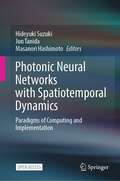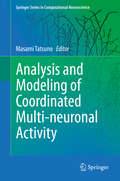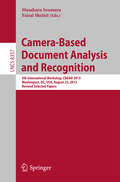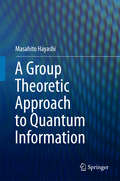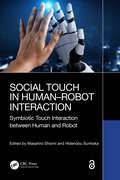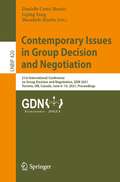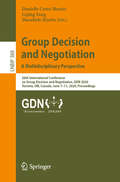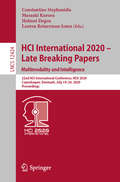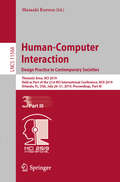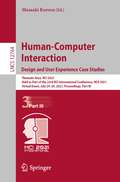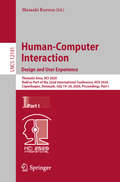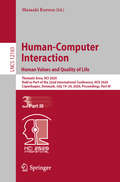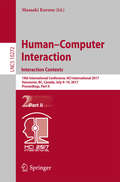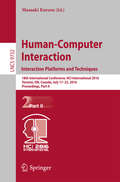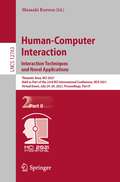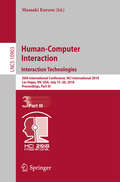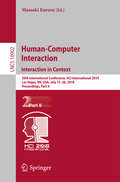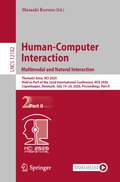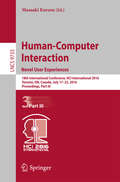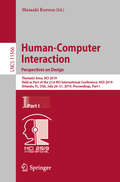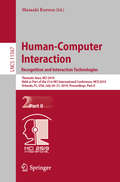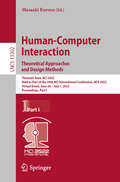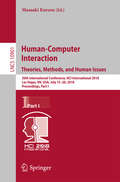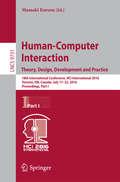- Table View
- List View
Photonic Neural Networks with Spatiotemporal Dynamics: Paradigms of Computing and Implementation
by Hideyuki Suzuki Jun Tanida Masanori HashimotoThis open access book presents an overview of recent advances in photonic neural networks with spatiotemporal dynamics. The computing and implementation paradigms presented in this book are outcomes of interdisciplinary studies by collaborative researchers from the three fields of nonlinear mathematical science, information photonics, and integrated systems engineering. This book offers novel multidisciplinary viewpoints on photonic neural networks, illustrating recent advances in three types of computing methodologies: fluorescence energy transfer computing, spatial-photonic spin system, and photonic reservoir computing. The book consists of four parts: Part I introduces the backgrounds of optical computing and neural network dynamics; Part II presents fluorescence energy transfer computing, a novel computing technology based on nanoscale networks of fluorescent particles; Parts III and IV review the models and implementation of spatial-photonic spin systems and photonic reservoir computing, respectively. These contents are beneficial to researchers in a broad range of fields, including information science, mathematical science, applied physics, and engineering, to better understand the novel computing concepts of photonic neural networks with spatiotemporal dynamics.
Analysis and Modeling of Coordinated Multi-neuronal Activity (Springer Series in Computational Neuroscience #12)
by Masami TatsunoSince information in the brain is processed by the exchange of spikes among neurons, a study of such group dynamics is extremely important in understanding hippocampus dependent memory. These spike patterns and local field potentials (LFPs) have been analyzed by various statistical methods. These studies have led to important findings of memory information processing. For example, memory-trace replay, a reactivation of behaviorally induced neural patterns during subsequent sleep, has been suggested to play an important role in memory consolidation. It has also been suggested that a ripple/sharp wave event (one of the characteristics of LFPs in the hippocampus) and spiking activity in the cortex have a specific relationship that may facilitate the consolidation of hippocampal dependent memory from the hippocampus to the cortex. The book will provide a state-of-the-art finding of memory information processing through the analysis of multi-neuronal data. The first half of the book is devoted to this analysis aspect. Understanding memory information representation and its consolidation, however, cannot be achieved only by analyzing the data. It is extremely important to construct a computational model to seek an underlying mathematical principle. In other words, an entire picture of hippocampus dependent memory system would be elucidated through close collaboration among experiments, data analysis, and computational modeling. Not only does computational modeling benefit the data analysis of multi-electrode recordings, but it also provides useful insight for future experiments and analyses. The second half of the book will be devoted to the computational modeling of hippocampus-dependent memory.
Camera-Based Document Analysis and Recognition: 5th International Workshop, CBDAR 2013, Washington, DC, USA, August 23, 2013, Revised Selected Papers (Lecture Notes in Computer Science #8357)
by Faisal Shafait Masakazu IwamuraThis book constitutes the thoroughly refereed post-workshop proceedings of the 5th International Workshop on Camera-Based Document Analysis and Recognition, CBDAR 2013, held in Washington, DC, USA, in August 2013. The 14 revised full papers presented were carefully selected during two rounds of reviewing and improvement from numerous original submissions. Intended to give a snapshot of the state-of-the-art research in the field of camera based document analysis and recognition, the papers are organized in topical sections on text detection and recognition in scene images and camera-based systems.
A Group Theoretic Approach to Quantum Information
by Masahito HayashiThis book is the first one addressing quantum information from the viewpoint of group symmetry. Quantum systems have a group symmetrical structure. This structure enables to handle systematically quantum information processing. However, there is no other textbook focusing on group symmetry for quantum information although there exist many textbooks for group representation. After the mathematical preparation of quantum information, this book discusses quantum entanglement and its quantification by using group symmetry. Group symmetry drastically simplifies the calculation of several entanglement measures although their calculations are usually very difficult to handle. This book treats optimal information processes including quantum state estimation, quantum state cloning, estimation of group action and quantum channel etc. Usually it is very difficult to derive the optimal quantum information processes without asymptotic setting of these topics. However, group symmetry allows to derive these optimal solutions without assuming the asymptotic setting. Next, this book addresses the quantum error correcting code with the symmetric structure of Weyl-Heisenberg groups. This structure leads to understand the quantum error correcting code systematically. Finally, this book focuses on the quantum universal information protocols by using the group SU(d). This topic can be regarded as a quantum version of the Csiszar-Korner's universal coding theory with the type method. The required mathematical knowledge about group representation is summarized in the companion book, Group Representation for Quantum Theory.
Social Touch in Human–Robot Interaction: Symbiotic touch interaction between human and robot
by Masahiro Shiomi Hidenobu SumiokaIn this book for researchers and students, editors Shiomi and Sumioka bring together contributions from researchers working on the CREST project at ATR Deep Interaction Laboratories, a world leader in social robotics, to comprehensively describe robot touch systems from hardware to applications.Appropriate touch from robots to humans is essential for social robots, but achieving this requires various solutions at every stage of the touch process. Through this book, readers will gain an understanding of the needs, essential systems and communication cues, behaviour designs, and real‑world issues for social touch applications. This book compiles and updates technical and empirical research that was previously scattered throughout the literature into a single volume. Through individually authored chapters addressing various elements of ATR’s CREST project, this book tackles key areas where understanding is needed to realize acceptable touch interaction, including pre‑touch interaction, interaction design for touching and being touched, behaviour changes caused by touch interaction, and applications of social touch interaction. It introduces a touch sensor and robots developed by the authors, including several touch‑related behaviours and design policies. This approach will enable readers to easily apply this knowledge to their own social robotics programs. This book is invaluable for anyone who wishes to understand and develop social robots that physically interact with people.It is most beneficial for researchers and upper undergraduate and graduate students in the fields of human–robot/agent/computer interaction and social touch interaction and those in the broader fields of engineering, computer science, and cognitive science.
Theory of JIZAI Body: Towards Mastery Over the Extended Self
by Masahiko InamiThis book proposes a novel body image to bridge gap between self-transformation and preserving sense of self: the Jizai body. Automation and digitization have served to transform our lives. Digital transformation, for example, is rapidly changing the world every day, making life more convenient and comfortable. However, there is a worrying trend of removing the human element from human-centric systems as technologies and algorithms become more capable. Leaving humanity behind, especially its corporal components, will leave persons unable to feel a sense of self in their newfound comfort. Despite the allure of an automated life, it is doubtful that the authors will find happiness without a sense of control. Exploring the essence of what makes us human from a physiological and psychological standpoint, the authors present a new perspective on what constitutes a body in this era where the real physical world and virtual information world coexist. The authors present state-of-the-art research which seeks to free humanity from its physical constraints and allow free control of both the natural and extended body. The next step in human evolution starts here.
Contemporary Issues in Group Decision and Negotiation: 21st International Conference on Group Decision and Negotiation, GDN 2021, Toronto, ON, Canada, June 6–10, 2021, Proceedings (Lecture Notes in Business Information Processing #420)
by Liping Fang Danielle Costa Morais Masahide HoritaThis book constitutes the refereed proceedings of the 21st International Conference on Group Decision and Negotiation, GDN 2021, which was planned to be held in Toronto, ON, Canada, during June 6–10, 2021. The conference was held virtually due to the COVID-19 pandemic.The field of Group Decision and Negotiation focuses on decision processes with at least two participants and a common goal but conflicting individual goals. Research areas of Group Decision and Negotiation include electronic negotiations, experiments, the role of emotions in group decision and negotiations, preference elicitation and decision support for group decisions and negotiations, and conflict resolution principles. The 12 full papers presented in this volume were carefully reviewed and selected from 74 submissions. They were organized in topical sections as follows: pandemic responses; preference modeling for group decision and negotiation; conflict resolution; and collaborative decision making processes.
Group Decision and Negotiation: 20th International Conference on Group Decision and Negotiation, GDN 2020, Toronto, ON, Canada, June 7–11, 2020, Proceedings (Lecture Notes in Business Information Processing #388)
by Liping Fang Danielle Costa Morais Masahide HoritaThis book constitutes the refereed proceedings of the 20th International Conference on Group Decision and Negotiation, GDN 2020, which was planned to be held in Toronto, ON, Canada, during June 7–11, 2020. The conference was cancelled due to the Coronavirus pandemic. Nevertheless, it was decided to publish the proceedings, because the review process had already been completed at the time the cancellation was decided. The field of Group Decision and Negotiation focuses on decision processes with at least two participants and a common goal but conflicting individual goals. Research areas of Group Decision and Negotiation include electronic negotiations, experiments, the role of emotions in group decision and negotiations, preference elicitation and decision support for group decisions and negotiations, and conflict resolution principles. The 14 full papers presented in this volume were carefully reviewed and selected from 75 submissions. They were organized in topical sections named: Conflict Resolution, Preference Modeling for Group Decision and Negotiation, Intelligent Group Decision Making and Consensus Process, Collaborative Decision Making Processes.
HCI International 2020 - Late Breaking Papers: 22nd HCI International Conference, HCII 2020, Copenhagen, Denmark, July 19–24, 2020, Proceedings (Lecture Notes in Computer Science #12424)
by Masaaki Kurosu Constantine Stephanidis Lauren Reinerman-Jones Helmut DegenThis book constitutes late breaking papers from the 22nd International Conference on Human-Computer Interaction, HCII 2020, which was held in July 2020. The conference was planned to take place in Copenhagen, Denmark, but had to change to a virtual conference mode due to the COVID-19 pandemic.From a total of 6326 submissions, a total of 1439 papers and 238 posters have been accepted for publication in the HCII 2020 proceedings before the conference took place. In addition, a total of 333 papers and 144 posters are included in the volumes of the proceedings published after the conference as “Late Breaking Work” (papers and posters). These contributions address the latest research and development efforts in the field and highlight the human aspects of design and use of computing systems.
Human-Computer Interaction. Design Practice in Contemporary Societies: Thematic Area, HCI 2019, Held as Part of the 21st HCI International Conference, HCII 2019, Orlando, FL, USA, July 26–31, 2019, Proceedings, Part III (Lecture Notes in Computer Science #11568)
by Masaaki KurosuThe 3 volume-set LNCS 11566, 11567 + 11568 constitutes the refereed proceedings of the Human Computer Interaction thematic area of the 21st International Conference on Human-Computer Interaction, HCII 2019, which took place in Orlando, Florida, USA, in July 2019. A total of 1274 papers and 209 posters have been accepted for publication in the HCII 2019 proceedings from a total of 5029 submissions. The 125 papers included in this HCI 2019 proceedings were organized in topical sections as follows: Part I: design and evaluation methods and tools; redefining the human in HCI; emotional design, Kansei and aesthetics in HCI; and narrative, storytelling, discourse and dialogue. Part II: mobile interaction; facial expressions and emotions recognition; eye-gaze, gesture and motion-based interaction; and interaction in virtual and augmented reality. Part III: design for social challenges; design for culture and entertainment; design for intelligent urban environments; and design and evaluation case studies.
Human-Computer Interaction. Design and User Experience Case Studies: Thematic Area, HCI 2021, Held as Part of the 23rd HCI International Conference, HCII 2021, Virtual Event, July 24–29, 2021, Proceedings, Part III (Lecture Notes in Computer Science #12764)
by Masaaki KurosuThe three-volume set LNCS 12762, 12763, and 12764 constitutes the refereed proceedings of the Human Computer Interaction thematic area of the 23rd International Conference on Human-Computer Interaction, HCII 2021, which took place virtually in July 2021.The total of 1276 papers and 241 posters included in the 39 HCII 2021 proceedings volumes was carefully reviewed and selected from 5222 submissions. The 139 papers included in this HCI 2021 proceedings were organized in topical sections as follows: Part I, Theory, Methods and Tools: HCI theory, education and practice; UX evaluation methods, techniques and tools; emotional and persuasive design; and emotions and cognition in HCI Part II, Interaction Techniques and Novel Applications: Novel interaction techniques; human-robot interaction; digital wellbeing; and HCI in surgery Part III, Design and User Experience Case Studies: Design case studies; user experience and technology acceptance studies; and HCI, social distancing, information, communication and work
Human-Computer Interaction. Design and User Experience: Thematic Area, HCI 2020, Held as Part of the 22nd International Conference, HCII 2020, Copenhagen, Denmark, July 19–24, 2020, Proceedings, Part I (Lecture Notes in Computer Science #12181)
by Masaaki KurosuThe three-volume set LNCS 12181, 12182, and 12183 constitutes the refereed proceedings of the Human Computer Interaction thematic area of the 22nd International Conference on Human-Computer Interaction, HCII 2020, which took place in Copenhagen, Denmark, in July 2020.*A total of 1439 papers and 238 posters have been accepted for publication in the HCII 2020 proceedings from a total of 6326 submissions. The 145 papers included in this HCI 2020 proceedings were organized in topical sections as follows: Part I: design theory, methods and practice in HCI; understanding users; usability, user experience and quality; and images, visualization and aesthetics in HCI. Part II: gesture-based interaction; speech, voice, conversation and emotions; multimodal interaction; and human robot interaction. Part III: HCI for well-being and Eudaimonia; learning, culture and creativity; human values, ethics, transparency and trust; and HCI in complex environments.*The conference was held virtually due to the COVID-19 pandemic.
Human-Computer Interaction. Human Values and Quality of Life: Thematic Area, HCI 2020, Held as Part of the 22nd International Conference, HCII 2020, Copenhagen, Denmark, July 19–24, 2020, Proceedings, Part III (Lecture Notes in Computer Science #12183)
by Masaaki KurosuThe three-volume set LNCS 12181, 12182, and 12183 constitutes the refereed proceedings of the Human Computer Interaction thematic area of the 22nd International Conference on Human-Computer Interaction, HCII 2020, which took place in Copenhagen, Denmark, in July 2020.*A total of 1439 papers and 238 posters have been accepted for publication in the HCII 2020 proceedings from a total of 6326 submissions. The 145 papers included in these HCI 2020 proceedings were organized in topical sections as follows: Part I: design theory, methods and practice in HCI; understanding users; usability, user experience and quality; and images, visualization and aesthetics in HCI. Part II: gesture-based interaction; speech, voice, conversation and emotions; multimodal interaction; and human robot interaction. Part III: HCI for well-being and Eudaimonia; learning, culture and creativity; human values, ethics, transparency and trust; and HCI in complex environments.*The conference was held virtually due to the COVID-19 pandemic.
Human-Computer Interaction. Interaction Contexts
by Masaaki KurosuThe five-volume set LNCS 8004--8008 constitutes the refereed proceedings of the 15th International Conference on Human-Computer Interaction, HCII 2013, held in Las Vegas, NV, USA in July 2013. The total of 1666 papers and 303 posters presented at the HCII 2013 conferences was carefully reviewed and selected from 5210 submissions. These papers address the latest research and development efforts and highlight the human aspects of design and use of computing systems. The papers accepted for presentation thoroughly cover the entire field of human-computer Interaction, addressing major advances in knowledge and effective use of computers in a variety of application areas. This volume contains papers in the thematic area of human-computer interaction, addressing the following major topics: identity, privacy and trust; user studies; interaction for society and community; HCI for business and innovation.
Human-Computer Interaction. Interaction Platforms and Techniques
by Masaaki KurosuThe 3-volume set LNCS 9731, 9732, and 9733 constitutes the refereed proceedings of the 18th International Conference on Human-Computer Interaction, HCII 2016, held in Toronto, ON, Canada, in July 2016. The total of 1287 papers presented at the HCII 2016 conferences was carefully reviewed and selected from 4354 submissions. The papers thoroughly cover the entire field of Human-Computer Interaction, addressing major advances in knowledge and effective use of computers in a variety of application areas. The volumes constituting the full 27-volume set of the conference proceedings.
Human-Computer Interaction. Interaction Techniques and Novel Applications: Thematic Area, HCI 2021, Held as Part of the 23rd HCI International Conference, HCII 2021, Virtual Event, July 24–29, 2021, Proceedings, Part II (Lecture Notes in Computer Science #12763)
by Masaaki KurosuThe three-volume set LNCS 12762, 12763, and 12764 constitutes the refereed proceedings of the Human Computer Interaction thematic area of the 23rd International Conference on Human-Computer Interaction, HCII 2021, which took place virtually in July 2021.The total of 1276 papers and 241 posters included in the 39 HCII 2021 proceedings volumes was carefully reviewed and selected from 5222 submissions. The 139 papers included in this HCI 2021 proceedings were organized in topical sections as follows: Part I, Theory, Methods and Tools: HCI theory, education and practice; UX evaluation methods, techniques and tools; emotional and persuasive design; and emotions and cognition in HCI Part II, Interaction Techniques and Novel Applications: Novel interaction techniques; human-robot interaction; digital wellbeing; and HCI in surgery Part III, Design and User Experience Case Studies: Design case studies; user experience and technology acceptance studies; and HCI, social distancing, information, communication and work
Human-Computer Interaction. Interaction Technologies: 20th International Conference, HCI International 2018, Las Vegas, NV, USA, July 15–20, 2018, Proceedings, Part III (Lecture Notes in Computer Science #10903)
by Masaaki KurosuThe 3 volume-set LNCS 10901, 10902 + 10903 constitutes the refereed proceedings of the 20th International Conference on Human-Computer Interaction, HCI 2018, which took place in Las Vegas, Nevada, in July 2018. The total of 1171 papers and 160 posters included in the 30 HCII 2018 proceedings volumes was carefully reviewed and selected from 4346 submissions. HCI 2018 includes a total of 145 papers; they were organized in topical sections named: Part I: HCI theories, methods and tools; perception and psychological issues in HCI; emotion and attention recognition; security, privacy and ethics in HCI. Part II: HCI in medicine; HCI for health and wellbeing; HCI in cultural heritage; HCI in complex environments; mobile and wearable HCI. Part III: input techniques and devices; speech-based interfaces and chatbots; gesture, motion and eye-tracking based interaction; games and gamification.
Human-Computer Interaction. Interaction in Context: 20th International Conference, HCI International 2018, Las Vegas, NV, USA, July 15–20, 2018, Proceedings, Part II (Lecture Notes in Computer Science #10902)
by Masaaki KurosuThe 3 volume-set LNCS 10901, 10902 + 10903 constitutes the refereed proceedings of the 20th International Conference on Human-Computer Interaction, HCI 2018, which took place in Las Vegas, Nevada, in July 2018. The total of 1171 papers and 160 posters included in the 30 HCII 2018 proceedings volumes was carefully reviewed and selected from 4346 submissions. HCI 2018 includes a total of 145 papers; they were organized in topical sections named: Part I: HCI theories, methods and tools; perception and psychological issues in HCI; emotion and attention recognition; security, privacy and ethics in HCI. Part II: HCI in medicine; HCI for health and wellbeing; HCI in cultural heritage; HCI in complex environments; mobile and wearable HCI. Part III: input techniques and devices; speech-based interfaces and chatbots; gesture, motion and eye-tracking based interaction; games and gamification.
Human-Computer Interaction. Multimodal and Natural Interaction: Thematic Area, HCI 2020, Held as Part of the 22nd International Conference, HCII 2020, Copenhagen, Denmark, July 19–24, 2020, Proceedings, Part II (Lecture Notes in Computer Science #12182)
by Masaaki KurosuThe three-volume set LNCS 12181, 12182, and 12183 constitutes the refereed proceedings of the Human Computer Interaction thematic area of the 22nd International Conference on Human-Computer Interaction, HCII 2020, which took place in Copenhagen, Denmark, in July 2020.*A total of 1439 papers and 238 posters have been accepted for publication in the HCII 2020 proceedings from a total of 6326 submissions. The 145 papers included in these HCI 2020 proceedings were organized in topical sections as follows: Part I: design theory, methods and practice in HCI; understanding users; usability, user experience and quality; and images, visualization and aesthetics in HCI. Part II: gesture-based interaction; speech, voice, conversation and emotions; multimodal interaction; and human robot interaction. Part III: HCI for well-being and Eudaimonia; learning, culture and creativity; human values, ethics, transparency and trust; and HCI in complex environments.*The conference was held virtually due to the COVID-19 pandemic.
Human-Computer Interaction. Novel User Experiences
by Masaaki KurosuThe 3-volume set LNCS 9731, 9732, and 9733 constitutes the refereed proceedings of the 18th International Conference on Human-Computer Interaction, HCII 2016, held in Toronto, ON, Canada, in July 2016. The total of 1287 papers presented at the HCII 2016 conferences was carefully reviewed and selected from 4354 submissions. The papers thoroughly cover the entire field of Human-Computer Interaction, addressing major advances in knowledge and effective use of computers in a variety of application areas. The volumes constituting the full 27-volume set of the conference proceedings.
Human-Computer Interaction. Perspectives on Design: Thematic Area, HCI 2019, Held as Part of the 21st HCI International Conference, HCII 2019, Orlando, FL, USA, July 26–31, 2019, Proceedings, Part I (Lecture Notes in Computer Science #11566)
by Masaaki KurosuThe 3 volume-set LNCS 11566, 11567 + 11568 constitutes the refereed proceedings of the Human Computer Interaction thematic area of the 21st International Conference on Human-Computer Interaction, HCII 2019, which took place in Orlando, Florida, USA, in July 2019. A total of 1274 papers and 209 posters have been accepted for publication in the HCII 2019 proceedings from a total of 5029 submissions. The 125 papers included in this HCI 2019 proceedings were organized in topical sections as follows: Part I: design and evaluation methods and tools; redefining the human in HCI; emotional design, Kansei and aesthetics in HCI; and narrative, storytelling, discourse and dialogue. Part II: mobile interaction; facial expressions and emotions recognition; eye-gaze, gesture and motion-based interaction; and interaction in virtual and augmented reality. Part III: design for social challenges; design for culture and entertainment; design for intelligent urban environments; and design and evaluation case studies.
Human-Computer Interaction. Recognition and Interaction Technologies: Thematic Area, HCI 2019, Held as Part of the 21st HCI International Conference, HCII 2019, Orlando, FL, USA, July 26–31, 2019, Proceedings, Part II (Lecture Notes in Computer Science #11567)
by Masaaki KurosuThe 3 volume-set LNCS 11566, 11567 + 11568 constitutes the refereed proceedings of the Human Computer Interaction thematic area of the 21st International Conference on Human-Computer Interaction, HCII 2019, which took place in Orlando, Florida, USA, in July 2019. A total of 1274 papers and 209 posters have been accepted for publication in the HCII 2019 proceedings from a total of 5029 submissions. The 125 papers included in this HCI 2019 proceedings were organized in topical sections as follows: Part I: design and evaluation methods and tools; redefining the human in HCI; emotional design, Kansei and aesthetics in HCI; and narrative, storytelling, discourse and dialogue. Part II: mobile interaction; facial expressions and emotions recognition; eye-gaze, gesture and motion-based interaction; and interaction in virtual and augmented reality. Part III: design for social challenges; design for culture and entertainment; design for intelligent urban environments; and design and evaluation case studies.
Human-Computer Interaction. Theoretical Approaches and Design Methods: Thematic Area, HCI 2022, Held as Part of the 24th HCI International Conference, HCII 2022, Virtual Event, June 26–July 1, 2022, Proceedings, Part I (Lecture Notes in Computer Science #13302)
by Masaaki KurosuThe three-volume set LNCS 13302, 13303 and 13304 constitutes the refereed proceedings of the Human Computer Interaction thematic area of the 24th International Conference on Human-Computer Interaction, HCII 2022, which took place virtually in June-July 2022. The 132 papers included in this HCI 2022 proceedings were organized in topical sections as follows: Part I: Theoretical and Multidisciplinary Approaches in HCI; Design and Evaluation Methods, Techniques and Tools; Emotions and Design; and Children-Computer Interaction, Part II: Novel Interaction Devices, Methods and Techniques; Text, Speech and Image Processing in HCI; Emotion and Physiological Reactions Recognition; and Human-Robot Interaction, Part III: Design and User Experience Case Studies, Persuasive Design and Behavioral Change; and Interacting with Chatbots and Virtual Agents.
Human-Computer Interaction. Theories, Methods, and Human Issues: 20th International Conference, HCI International 2018, Las Vegas, NV, USA, July 15–20, 2018, Proceedings, Part I (Lecture Notes in Computer Science #10901)
by Masaaki KurosuThe 3 volume-set LNCS 10901, 10902 + 10903 constitutes the refereed proceedings of the 20th International Conference on Human-Computer Interaction, HCI 2018, which took place in Las Vegas, Nevada, in July 2018. The total of 1171 papers and 160 posters included in the 30 HCII 2018 proceedings volumes was carefully reviewed and selected from 4346 submissions. HCI 2018 includes a total of 145 papers; they were organized in topical sections named: Part I: HCI theories, methods and tools; perception and psychological issues in HCI; emotion and attention recognition; security, privacy and ethics in HCI. Part II: HCI in medicine; HCI for health and wellbeing; HCI in cultural heritage; HCI in complex environments; mobile and wearable HCI. Part III: input techniques and devices; speech-based interfaces and chatbots; gesture, motion and eye-tracking based interaction; games and gamification.
Human-Computer Interaction. Theory, Design, Development and Practice
by Masaaki KurosuThe 3-volume set LNCS 9731, 9732, and 9733 constitutes the refereed proceedings of the 18th International Conference on Human-Computer Interaction, HCII 2016, held in Toronto, ON, Canada, in July 2016. The total of 1287 papers presented at the HCII 2016 conferences was carefully reviewed and selected from 4354 submissions. The papers thoroughly cover the entire field of Human-Computer Interaction, addressing major advances in knowledge and effective use of computers in a variety of application areas. The volumes constituting the full 27-volume set of the conference proceedings are listed on pages VII and VIII.
